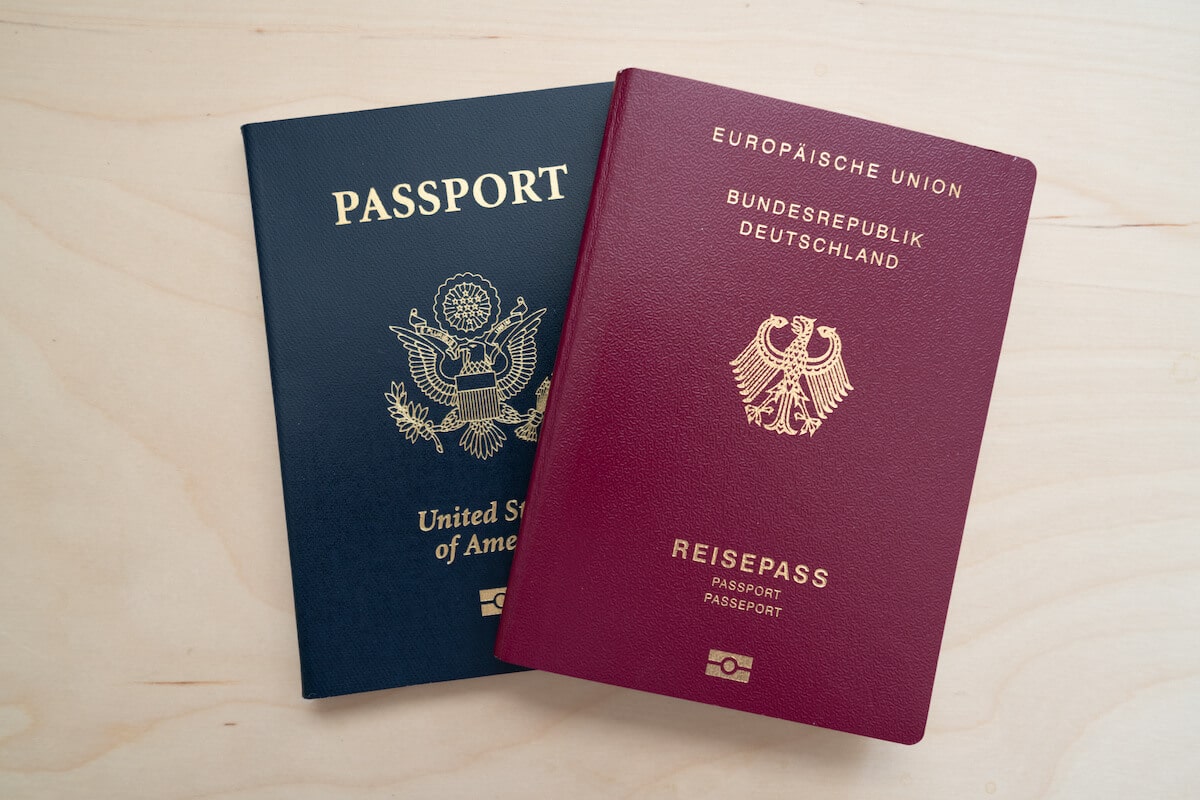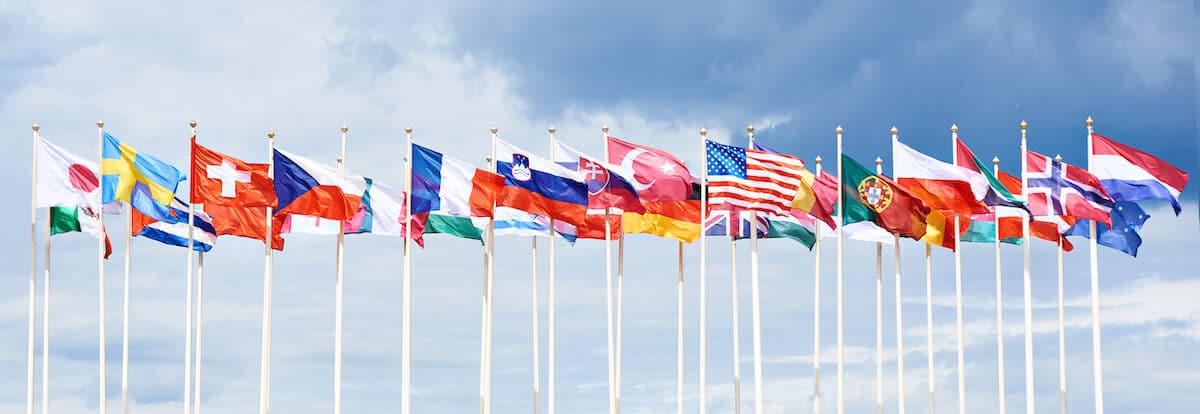
Citizenship is more than nationality, though the terms are often used interchangeably. It gets confusing because dual nationals are considered to be people who hold the citizenship status of two countries at the same time. When you’re a citizen of a country, you’re legally part of a nation-state, which gives you both rights and responsibilities.
For instance, citizenship may entitle you to vote, receive certain protections from your government, work for a national government, and enjoy visa-free travel. Other benefits may include buying real estate you couldn’t otherwise purchase and taking advantage of public healthcare. For instance, countries like Canada and the United Kingdom have national health systems for their citizens.
Our team here at Remitly put together this guide to talk about multiple citizenships and how many citizenships you can have at one time.
Most people hold just one citizenship. However, it’s possible to have citizenship in multiple countries, and with a second citizenship (or third), you may count yourself as a member of more than one nation. There is no international limit on how many citizenships a single person can possess. Each country has its own rules about if it allows dual citizenship or more than one passport, some of which are more restrictive than others.
Interested in multiple citizenships? We’ll explore how they work, along with the citizenship laws of different countries and potential drawbacks.
How multiple citizenship works
Every country has its own laws to determine citizenship. Usually, when a child is born to two citizens of the same country, the child holds the same citizenship as their parents. This covers the vast majority of people and is the primary way of establishing one’s citizenship. There are other ways it can be determined, however.

Birthright citizenship
Birthright citizenship is practiced in dozens of countries. Countries with birthright citizenship bestow citizenship upon any child born within their borders. Birthright citizenship is a common way for children to be born with dual citizenship or even triple citizenship if their parents are from different countries.
The United States, as well as most other countries in North and South America, in addition to Caribbean states like Antigua and Barbuda, have birthright citizenship. Many close allies of the USA, though, do not have this policy. For example, Germany, France, Japan, and India all have more restrictive laws about whether and how children born within their borders can become citizens.
Some countries, like Thailand and Malaysia, have “weaker” birthright citizenship laws with more conditions. For example, the parents must have lived in the country for a certain amount of time before their newborn can become a citizen. Check local laws before you start the process of claiming birthright citizenship.
Citizenship by marriage
Another common way to pick up citizenship outside your home country is through marriage to a citizen of another country. Countries like Spain, Portugal, Malta, Switzerland, and the Netherlands all grant citizenship if you marry someone who is already a citizen.
Note, though, that this is hardly the case in all countries. The U.S. government enforces several requirements for spouses of citizens before they can obtain U.S. citizenship. Ireland and Italy have similar requirements, with Italy requiring that would-be spousal citizens pass a test in Certification of Italian as a Foreign Language (CILS)
Naturalization
Naturalization refers to the practice of applying to a government bureau or court system to become a citizen of a country. In the United States, for instance, you can become an American citizen through the United States Citizenship and Immigration Services. Japan, on the other hand, naturalizes citizens through its Ministry of Justice.
Note that often, countries would rather not grant citizenship through naturalization if the person will then have to obtain multiple citizenships elsewhere. You may find that the country in which you are trying to naturalize will want you to renounce any other citizenships you have. In practice, this prevents most people from obtaining multiple citizenship through naturalization.
Citizenship-by-investment programs
Citizenship-by-investment programs allow a person to obtain citizenship in exchange for making a financial contribution to the country or buying approved real estate there. For example, the nation of St. Kitts and Nevis in the Caribbean grants citizenship with a $150,000 donation to their Sustainable Growth Fund, with a $175,000 contribution to the Alternative Investment Option, or with a real estate purchase that meets certain criteria.

How many citizenships can you have?
Different countries have different views on whether multiple citizenships should be tolerated. The United States allows the practice, though not universally. For example, military service in the armed forces of another country can cause a U.S. citizen to lose their American citizenship.
Check the specific laws of the two countries you’re curious about to see whether dual citizenship is possible. (Note that dual nationality, which arises from having parents from different countries, is slightly different from dual citizenship agreements and may also be recognized differently by different countries.)
There are over 20 countries that allow dual citizenship with the United States, from Albania to Zambia.
Lastly, you don’t need to become a citizen to reside in another country. Many of the benefits of citizenship can be obtained with legal permanent residence or a residence permit or green card. As for travel, international travelers with single citizenship typically have a lot of freedom of movement, particularly if they have a U.S. passport. A second passport is often unnecessary.
Frequently asked questions about multiple citizenships
Can anyone have three citizenships?
Yes, it’s possible for someone to hold three citizenships, depending on the laws and regulations of the countries involved. However, the ability to hold multiple citizenships varies widely from country to country and is often subject to specific legal conditions. A foreign country may allow dual or even multiple citizenship, while others may have restrictions or require individuals to renounce their previous citizenship if they get a new one.
It’s important to note that the laws and regulations governing citizenship can change over time, and they can be complex. If you’re interested in acquiring or maintaining more than one citizenship, it’s advisable to consult with legal experts or government authorities in the countries involved to fully understand the requirements and implications.
How many citizenships does the U.S. allow?
The United States allows individuals to hold multiple citizenships. However, the U.S. government does not restrict its citizens from acquiring or holding citizenship in other countries. This means that if you are a U.S. citizen and meet the eligibility criteria for citizenship in another country, you can potentially acquire and be dual citizens in both the United States and another country simultaneously.
It’s important to note that while the U.S. allows multiple citizenships, other countries may have different rules and restrictions. If you are considering acquiring multiple citizenships, it’s recommended to research and understand the laws and regulations of all the countries involved to ensure you comply with their requirements.
Which countries allow dual citizenship?
Many countries around the world allow dual citizenship, meaning individuals can hold the citizenship of more than one country at the same time. However, the specific laws and regulations regarding dual citizenship can vary widely from country to country. Here are some examples of countries that generally allow dual citizenship:
- United States: The U.S. allows its citizens to hold either dual nationality status or multiple citizenships.
- Canada: Canada permits dual citizenship. Canadian citizens who become citizens of other countries do not lose their Canadian citizenship.
- United Kingdom: The UK allows dual citizenship, but there are some restrictions for certain Commonwealth citizens.
- Australia: Australia generally allows dual citizenship, but there are some limitations for those acquiring citizenship in certain countries.
- New Zealand: New Zealand generally permits dual citizenship, but it’s advisable to check the rules for specific situations.
- Germany: Germany generally allows dual citizenship for EU citizens and some other cases, but there are restrictions for non-EU citizens.
- France: France allows dual citizenship, but it depends on the other country’s laws.
- Mexico: Mexico permits dual citizenship.
- Brazil: Brazil allows dual citizenship, but there are some restrictions.
- Italy: Italy generally allows dual citizenship for descendants of Italian citizens.
- Spain: Spain generally allows dual citizenship for certain cases.
- South Africa: South Africa permits dual citizenship, but citizens are advised to notify the government if they acquire another country’s citizenship first.
These are just a few examples, and the list is not exhaustive. It’s important to note that the rules and regulations regarding dual citizenship can change, and they can also vary within a country depending on specific circumstances. If you are interested in acquiring dual citizenship, it’s recommended to consult with legal experts or government authorities in the relevant countries to understand the current laws and requirements.

Which countries allow triple citizenship?
The concept of triple citizenship, where an individual holds the citizenship of three different countries simultaneously, is more complex and less common than dual citizenship. The ability to hold dual, triple, and multiple citizenships depends on the specific laws and regulations of the countries involved. While some countries allow individuals to hold multiple citizenships, including three or more, it’s important to note that the rules and conditions can vary widely.
Here are a few examples of countries that generally allow for multiple nationalities or have conditions for triple citizenship:
- Brazil: Brazil generally allows triple citizenship in certain cases.
- Israel: Israel permits triple citizenship for individuals who acquire citizenship by birth or descent and then naturalize in another country.
- France: France permits triple citizenship, but it depends on the other countries involved and their laws.
- Argentina: Argentina generally allows triple citizenship in specific cases.
- Dominican Republic: The Dominican Republic allows triple citizenship, but individuals must meet certain requirements.
- Panama: Panama allows triple citizenship under certain conditions.
- Philippines: The Philippines allows triple citizenship in certain situations, particularly for those who have naturalized in other countries.
- Italy: Italy may allow triple citizenship for individuals with Italian ancestry, but it depends on the specific circumstances.
It’s important to conduct thorough research and seek advice from legal experts or government authorities in the relevant countries if you are considering acquiring or already possessing triple citizenship. Citizenship laws and regulations are subject to change, and the specific requirements can vary widely based on individual circumstances and the countries involved.
Visit the homepage, download our app, or check out our Help Center to get started.
